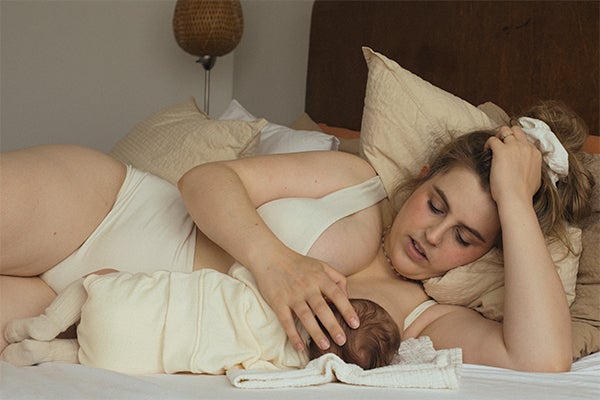Breastfeeding at night
How often should my baby eat at night? And which position is best for breastfeeding during the nighttime? In this article, Ebba Åback, midwife at the Swedish healthcare app Numa, shares tips and advice about nursing at night.
The midwife's tips
Breastfeeding at night has great benefits! Firstly, it's easy for both you and your baby to go back to sleep. And secondly, it boosts milk production as levels of prolactin, the hormone that stimulates lactation, are extra high at night. Babies' night feeding vary. Listen to your baby's signals. After the first few weeks, a healthy baby doesn't need waking to feed.
Side-lying breastfeeding
Lie on your side with the lower arm above your head or straight out in front; pushing out your bottom so your body is in a V-shape. Your baby lies with its tummy towards yours. Help your baby to the breast closest to the mattress by gently pushing between its shoulders.
Side-lying breastfeeding over the breast
Lie on your side as in the previous position, but nurse from the other breast by leaning over a little and offering your baby the top breast. This position is especially good if you have large breasts. It also works if you have small breasts, but then you may need to lean a little more onto your tummy.
Laid-back breastfeeding
Half sit or lie with lots of pillows behind you for a semi-reclined position in bed. Put your baby on its tummy between your breasts. When it wants to feed, the baby will latch on to one of your breasts and will then automatically be in a diagonal position. Holding your baby close will be effortless and will just require you to support your baby with the arm on the side that it is feeding.

Breastfeeding only at night
To breastfeed only at night can be an option for those who want to carry on nursing when the baby has started to eat solid food during the day, or if the mum is away during the day. It is an opportunity to be close to your baby and can help comfort the baby and make the night easier. The most important thing is to find the solution that works best for you and your baby.
Partial breastfeeding at night
After 4-6 months, babies that are gaining weight normally do not need to feed at night. But breastfeeding is about much more that food; it is about feeling calm, comforted, close and secure.
After a while, your breasts will adapt to your baby's routines and needs. The milk supply can be low during the day and high at night. It doesn't dry up as long as you carry on breastfeeding and the supply adjusts to your baby's demands.
What others think…. The hardest thing with breastfeeding babies over 6 months old at night is often coping with what others think one should do. There are so many opinions about nursing at night and people are quick to voice them. Do what is best for you and your baby!
Remember that breast milk retains its nutrition even as the child grows older! It continues to contain antibodies that protect the child against many infections, e.g. ear infections. It also strengthens the mother's long-term protection against many health problems, including cardio-vascular disease, cancer and diabetes.
/Ebba Åback midwife at Numa

Discover more
- Size guide
- Sustainable washing instructions
- Guide to our maternity pants
- Guide to our nursing bras
- Buy a nursing bra? All you need to know
- Hospital bag checklist
- Period underwear - how does it work?
- Postpartum exercise - Tips & advice
- Pregnancy yoga and postpartum yoga
- Check your breasts - Our guide
- Babymoon - all you need to know
